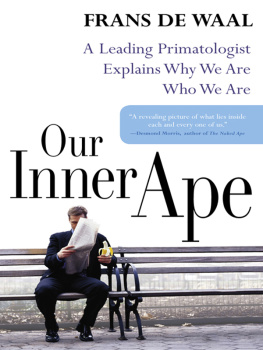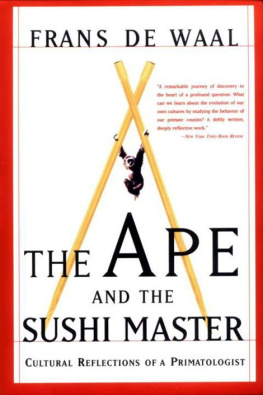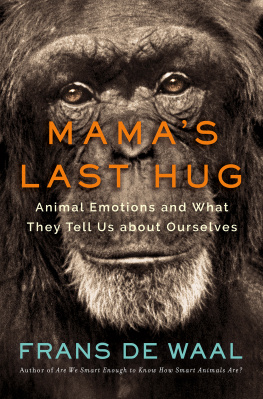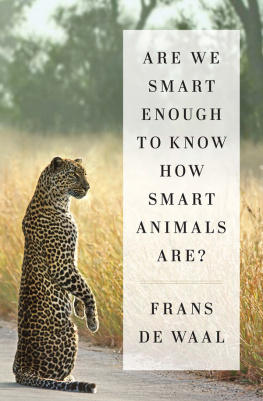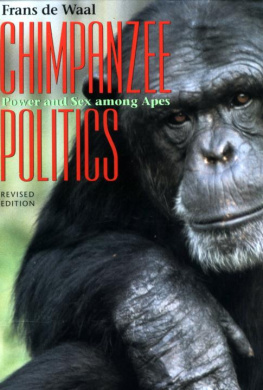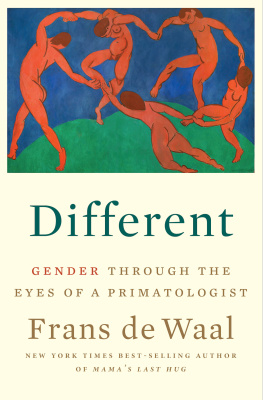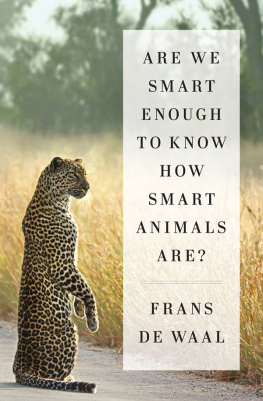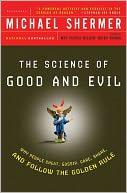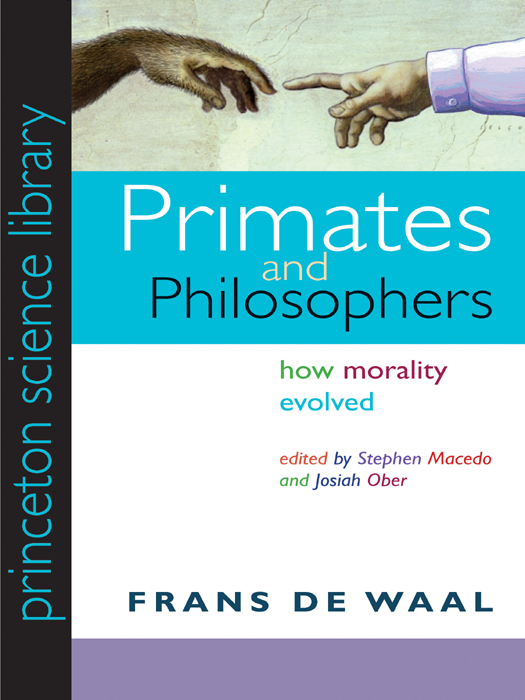Waal, F. B. M. de (Frans B. M.), 1948
Primates and philosophers : how morality evolved / Frans de Waal; edited and
introduced by Stephen Macedo and Josiah Ober; Christine M. Korsgaard [et al.].
p. cm.
Includes bibliographical references and index.
ISBN-13: 978-0-691-12447-6 (hardcover : alk. paper)
ISBN-10: 0-691-12447-7 (hardcover : alk. paper)
1. Ethics, Evolutionary. 2. PrimatesBehavior. 3. Altruistic behavior in
animals. I. Macedo, Stephen, 1957 II. Ober, Josiah. III. Korsgaard,
Christine M. (Christine Marion) IV. Title.
BJ1311.W14 2006
171.7dc22
2006013905
Contents

Introduction:
Josiah Ober and Stephen Macedo
PART I Morally Evolved:
Primate Social Instincts, Human Morality,
and the Rise and Fall of Veneer Theory
Appendix A:
Anthropomorphism and Anthropodenial
Appendix B:
Do Apes Have a Theory of Mind?
Appendix C:
Animal Rights
The Uses of Anthropomorphism
Robert Wright
Morality and the Distinctiveness of Human Action
Christine M. Korsgaard
Ethics and Evolution: How to Get Here from There
Philip Kitcher
Morality, Reason, and the Rights of Animals
Peter Singer
The Tower of Morality
Frans de Waal
Acknowledgments

I would like to thank Philip Kitcher, Christine M. Korsgaard, Richard Wrangham, and Robert A. Wright, who were the commentators for the Tanner Lectures that I gave at Princeton University in November of 2003. Also, I thank Peter Singer for his comments, which appear in this publication, and Stephen Macedo and Josiah Ober for their introduction. I am grateful to the Tanner Foundation, which endows the Tanner Lecture Series; to the Princeton University Press, with special thanks to Sam Elworthy and Jodi Beder, editor and copy editor; and to the staff of the Center for Human Values who organized the lectures and helped coordinate this books production: Stephen Macedo, director; Will Gallaher, former associate director; and Jan Logan, assistant director. Finally, I am grateful to Emory Universitys Yerkes National Primate Research Center, in Atlanta, Georgia, and other centers and zoos at which I have conducted research, as well as to all of my many collaborators and graduate students for helping collect the data presented here.
Frans de Waal
March 2006
Introduction
JOSIAH OBER AND STEPHEN MACEDO

I n the Tanner Lectures on Human Values that became the lead essay in this book, Frans de Waal brings his decades of work with primates, and his habit of thinking deeply about the meaning of evolution, to bear upon a fundamental question about human morality. Three distinguished philosophers and a prominent student of evolutionary psychology then respond to the way de Waals question is framed, and to his answer. Their essays are at once appreciative of de Waals endeavor and critical of certain of his conclusions. De Waal responds to his critics in an afterword. While there is considerable disagreement among the five essayists about both the question and how to answer it, they also share a good deal of common ground. First, all contributors to this book accept the standard scientific account of biological evolution as based on random natural selection. None suggests that there is any reason to suppose that humans are different in their metaphysical essence from other animals, or at least, none base their arguments on the idea that humans uniquely possess a transcendent soul.
A second important premise that is shared by de Waal and all four of his commentators is that moral goodness is something real, about which it is possible to make truth claims. Goodness requires, at a minimum, taking proper account of others. Badness, by the same token, includes the sort of selfishness that leads us to treat others improperly by ignoring their interests or treating them as mere instruments. The two basic premises of evolutionary science and moral reality establish the boundaries of the debate over the origins of goodness as it is set forth in this book. This means that those religious believers who are committed to the idea that humans have been uniquely endowed with special attributes (including a moral sense) by divine grace alone are not participants in the discussion as it is presented here. Nor are social scientists committed to a version of rational agent theory that regards the essence of human nature as an irreducible tendency to choose selfishness (free-riding, cheating) over voluntary cooperation. Nor, finally, are moral relativists, who believe that an action can be judged as right or wrong only locally, by reference to contingent and contextual considerations. So what we offer in this volume is a debate among five scholars who agree on some basic issues about science and morality. It is a serious and lively conversation among a group of thinkers who are deeply committed to the value and validity of science and to the value and reality of other-regarding morality.
The question that de Waal and his commentators seek to address is this: How, given that there are strong scientific reasons to suppose that selfishness (at least at the genetic level) is a primary mechanism of natural selection, did we humans come to be so strongly attached to the value of goodness? Or, to put it a bit differently, why dont we think it is good to be bad? For those who believe that morality is real, but that it cannot be explained or justified simply by resort to the theological assumption that a unique human propensity to goodness is a product of a divine grace, this is a hard problem, and an important one.
De Waals aim is to argue against a set of answers to his whence morality? question that he describes as Veneer Theorythe argument that morality is only a thin veneer overlaid on an amoral or immoral core. De Waal suggests that Veneer Theory is (or at least was until recently) quite widely held. His primary target is Thomas Huxley, a scientist dubbed Darwins bulldog for his fierce defense of Darwins theory of evolution against its late-nineteenth-century detractors. De Waal argues that Huxley betrayed his own core Darwinian commitments in advocating a view of morality as garden tendinga constant battle against the luxuriant weeds of immoralism that perennially threaten to take over the human psyche. De Waals other targets include some social contract theorists (notably Thomas Hobbes) who begin with a conception of humans as fundamentally asocial or even antisocial, and some evolutionary biologists who, in his view, tend to overgeneralize from the established role of selfishness in the natural selection process.


